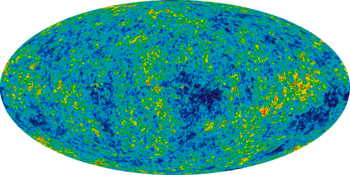Hadron epoch
| Part of a series on | |||
| Physical cosmology | |||
|---|---|---|---|
 | |||
|
Early universe
|
|||
|
Components · Structure |
|||
| |||
In physical cosmology, the hadron epoch was the period in the evolution of the early universe during which the mass of the universe was dominated by hadrons. It started approximately 10−6 seconds after the Big Bang, when the temperature of the universe had fallen sufficiently to allow the quarks from the preceding quark epoch to bind together into hadrons. Initially the temperature was high enough to allow the formation of hadron/anti-hadron pairs, which kept matter and anti-matter in thermal equilibrium. However, as the temperature of the universe continued to fall, hadron/anti-hadron pairs were no longer produced. Most of the hadrons and anti-hadrons were then eliminated in annihilation reactions, leaving a small residue of hadrons. The elimination of anti-hadrons was completed by one second after the Big Bang, when the following lepton epoch began.
See also
References
- Allday, Jonathan (2002). Quarks, Leptons and the Big Bang. Second Edition. ISBN 0-7503-0806-0.
- Physics 175: Stars and Galazies - The Big Bang, Matter and Energy; Ithaca College, New York